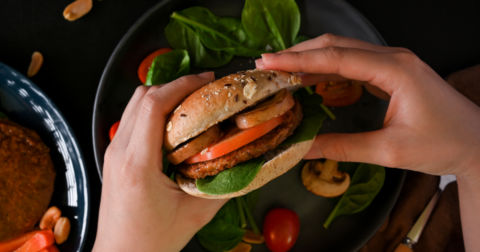Explainer
How Overconsumption Affects the Environment and Health, Explained
Climate•12 min read
Reported
Over one million social media posts amplify misinformation about “soyboys” and “fake meat."


Words by Sophie Kevany
Conspiracy theories are undermining efforts to reduce consumption of factory farmed meat and dairy, a new report finds. A surge of online misinformation could be delaying necessary climate action, the researchers say, as nearly one million social media posts amplified misinformation about plant-based alternatives.
Despite a slew of scientific research showing that countries in the global north could reduce greenhouse gas emissions, notably methane, and improve population health, all by eating more plants and fewer animals, people in Europe and the Americas are eating 300 percent to 600 percent more than the recommended amount of meat, the report says.
The report, released Wednesday by the Changing Markets Foundation, analyzed over 285 million digital posts, mostly on X, formerly known as Twitter, over a 14-month period to 31 July 2023. Of these, the report said, close to one million featured meat and dairy misinformation.
Changing diets and protecting environments are difficult tasks which, the report says, are made significantly harder by “severe backlash” on social media. Such posts are generated and promoted by fringe protesters, the meat and dairy industries, right wing conspiracy theorists and “misinfluencers,” a term the report uses to describe individuals or entities that actively disseminate or amplify “misleading information” that significantly influences “the narratives and beliefs of online communities.”
Titled Truth, Lies and Culture Wars, the report finds that most misinformation, almost 80 percent, falls into the “disparage” category, attacking meat and dairy alternatives using three dominant narratives: soyboys, vegan cultists and meat masculinity.
The soyboy narrative ridicules men that consume soy directly, rather than via the meat of intensively farmed animals fed on soybean. Soy, the false narrative claims, elevates estrogen levels “leading to perceived physical and emotional vulnerabilities.”
The vegan cultist narrative “attempts to marginalize vegans … [and] undermine the legitimacy of their dietary choices and climate action” — framing calls to reduce meat consumption as coming from zealots or cultists.
On the other hand, the meat masculinity narrative “focuses on pseudoscientific claims suggesting that meat (especially red meat) and eggs are the epitome of nutrition” and encourages links between meat consumption and male dominance.
About 20 percent of the misinformation featured “enhance” narratives. These use health-washing, which positions “animal-based food products as essential for good health,” and greenwashing, which frames “animal products as environmentally friendly options,” to promote meat and dairy consumption.
Overall, the most “pervasive” form of misinformation, says Maddy Haughton-Boakes of Changing Markets, are the attacks on alternative proteins that focus on “supposedly dubious ingredients.”
In one now infamous example Rick Berman, founder of the Center for Consumer Freedom “suggested the ingredients in alternative proteins are like dog food or should require a cancer warning,” Haughton-Boakes says.
The report said advertisements placed by the Center in prominent U.S. newspapers have included language like ‘Fake Meat Has WHAT in It!’ and ‘Should Fake Meat Have a Cancer Warning?’
At a national policy level, the report looks at how Dutch government efforts to reduce agricultural emissions were overtaken by a mishmash of conspiracy theories, including The Great Reset which frames dietary change as an “elite agenda“ and gained traction in the Netherlands, eventually leading to mass protests by Dutch farmers.
In other parts of the world, the Great Reset conspiracy theory has included unfounded claims that cancer cells were “discovered” in “Bill Gates-Backed Lab-Grown Meat.”
Tweets (now posts on X) documented by the report claim that Dutch emissions reduction efforts, which included proposals to buy out livestock farmers wanting to leave the sector, were coming from the “tyrannical Great Reset Netherlands government” which “farmers must win against”.
In the Netherlands, overly high nitrogen oxide and ammonia emissions, which threaten protected plant and wildlife habitats, are linked to the country’s intensive livestock production.
The report says the misinformation narrative essentially “subverted [Dutch] government efforts to reduce emissions into accusations of planned land theft, stoking fears of radical government actions.”
Those fears, says Haughton-Boakes, have now translated into votes for a far-right candidate, Geert Wilders.
“In the Netherlands, we can already see the impact of that misinformation because one of the leading misinformation sources, Geert Wilders, has just won an election victory.”
Last week, Wilders won an unexpected 37 seats in the Dutch lower house of parliament. It is not yet known if he will be able to form a government, however, and negotiations could take months.
“[Wilders] has said, for example, that the Dutch government’s policy to reduce emissions from nitrogen and ammonia, and proposals to buy up farm land and allow farmers to leave the sector [known as a stopbonus], is part of a plan to take land from the Dutch people and give it to migrants,” says Haughton-Boakes.
In a second case study the report looks at the misinformation trajectory of a non-peer reviewed UC Davis research paper that suggested cultivated meat would do more environmental damage than animal meat, called “misleading” by the report’s authors.
Although UC Davis is known for its livestock industry links, the non-peer reviewed research was covered with a blitz of news media, including the New Scientist and the mainstream Irish newspaper, The Irish Independent.
The Irish Independent is generally known for adhering to normal journalistic standards, but the UC Davis story contained no link to the study, failed to say it had not been peer-reviewed and provided no comment from the cultivated meat sector.
In Ireland, Haughton-Boakes says it is “too early to say how much influence meat and dairy misinformation has had on government policy.” What is clear, she says, is that “misinformation will make it even harder for the Irish government to set policies to meet its 25 percent agricultural sector emissions reduction target by 2030.”
As for the rest of the world, Haughton-Boakes says the report aims to “highlight to governments the kinds of meat and dairy misinformation out there so they can deal with it and keep the focus on what the science is telling us about methane … [which in many cases requires] … reducing animal numbers and eating less animal protein.”
Neither the Irish Independent nor the Center for Consumer Freedom replied to requests for comment.